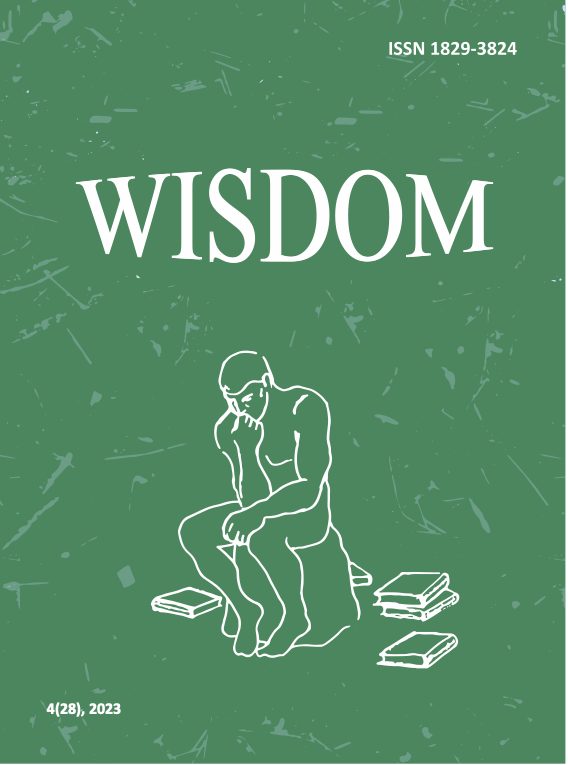Technical University as an Innovative Factor of Culture
DOI:
https://doi.org/10.24234/wisdom.v25i1.976Keywords:
innovation, technical university, techno-humanitarian balance, cultural meaning, humanitarian environment, personality-centered education, spiritualityAbstract
This study aims to consider the technical university as a factor for innovation in modern culture. The author’s task is to identify the phenomenological (sociocultural) and ontological (pedagogical, personal, organizational) foundations of a technical university as an innovative factor. The methodological basis of the study is made up of identifying value concepts, a pragmatic method, and a criterion of effectiveness. The technical university as an innovative factor is revealed through research: concentration of innovations in engineering and technical activities; the cultural meaning of innovation; the peculiarities of the formation and development of the humanitarian environment by the technical university and its spiritual and moral component. The criterion of effectiveness refers to the use of pedagogical models by a technical university and a spiritual and moral component. The study deepens the understanding of the innovative factors of culture that have developed in science and makes it possible in practice to improve the technical university in line with the innovative trends of our time.
Downloads
References
Berdyaev, N. A. (1994). Philosophia svobodnogo duha (Philosophy of a free spirit, in Russian). Moscow: Respublika.
Bezklubaya, S. A. (2020). The development of the spirituality of a technical universityís lecturer in an advanced training system. Nova Prisutnost, 3(18), 517-530. DOI: https://doi.org/10.31192/np.18.3.6
Carneiro, R. L. (1997). Kul'turny process (The cultural process, in Russian). Antologia issledovaniy kul'tury (Anthology of Cultural Studies, in Russian), 1, 421-439.
Chubatov, A. A. (2018). Phenomenologia and ontologia: k postanovke voprosa (Phenomenology and ontology: to the formulation of the question, in Russian). Elektronny nauchno-metodochesky zhurnal Omskogo GAU (Electronic scientific and methodological journal of Omsk State Agrarian University, in Russian), 3(14), 16-21.
Churlyaeva, N. P. (2005). Strukturno-kompetentnostny podhod k postroeniyu pedagogicheskoy sistemy podgotovki specialistov v tehnicheskom vuze (Structural-competence approach to building a pedagogical system for training specialists in a technical university, in Russian). Krasnoyarsk: SGAU named after M. F. Reshetnev.
Efremova, P. V., & Romanova, I. M. (2016). Osobennosti organizatsii innovacionnoy deyatel'nosti v vuzah RF (Features of the organization of innovative activities in the universities of the Russian Federation, in Ruaaian). Izvestiya DVFU (News of FESU, in Russian), 3(79), 61-75.
Eskindarov, M. A. & Silvestrov, S. N. (Eds.). (2014). Innovatsionnoye razvitiye Rossii: problemy i resheniya (Innovative development of Russia: Challenges and solutions, in Russian). Moscow: Financial University.
Heidegger, M. (1989). Die Grundprobleme der Phanomenologie (SS1927). Frankfurt am Main: GA 24 / Hrsg. von F.-W. von Herrmann.
Ilyenkov, E. V. (1991). Philosophia i kul'tura (Philosophy and culture, in Russian). Moscow: Politizdat.
Ivanov, V. G., & Kondratyev, V. V. (2014). Inzhenernoe obrazovanie i inzhenernaya pedagogika: problemy i resheniya (Engineering Education and Engineering Pedagogy: Problems and Solutions, in Russian). Vestnik Kasanskogo tehnologicheskogo universiteta (Bulletin of Kazan Technological University, in Russian), 24(17), 262-271.
Kagan, F., & Belugina, G. (1996). Gumanitarnaya sreda v tekhnicheskom vuze (Humanitarian environment at a technical university, in Russian). Vyschee obrazovanie v Rossii (High Education in Russia, in Russian), 4, 51-55.
Kolonitskaya, O. A. (2012). Gumanitarnaya sreda - odin iz sposobov resheniya problem vysshego professional'nogo obrazovaniya (The humanitarian environment is one of the ways to solve the problems of higher professional education, in Russian). Molodoy uchyony (Young Scientist, in Russian), 5, 431-435.
Kudrin, B. I. (1993). Vvedenie v tehnetiku (Introduction to technetics, in Russian). Tomsk: Tomsk University Press.
Kuznetsov, E. B. (Ed.). (2015). Natsional'nyy doklad ob innovatsiyakh v Rossii 2015 (National Report on Innovations in Russia 2015, in Russian). Retrieved March 7, 2023, from https://1997.rif.ru/upload/iblock/b80/b808ebb0f854b355276443b0d7932957.pdf
Lazorak, O. V. (2013). Gumanitarnaya napravlennost' v obrazovanii studentov tekhnicheskikh spetsi-al'nostey: ekzistentsial'nyy aspekt (Humanitarian orientation in the education of students of technical specialties: Existential aspect, in Russian). Fundamental'nye issledovaniya (The Fundamental Researches, in Russian), 8(10), 1801-1805.
Massovyye otkrytyye onlayn kursy (MOOC) (Massive open online courses (MOOCs), in Russian) (2015). Elektronnyye obrazovatel'nyye resursy. KNITU-KAI im. A.N. Tupoleva (Electronic educational resources. KNRTU-KAI named after A.N. Tupolev, in Russian). Retrieved from https://eto.kai.ru/resources/edr/mooc/
Motorina, L. E., & Sytnik, V. M. (2020). Existential, instrumental and cyber spaces as ontological modi of human being. Nova Prisutnost, 3(18), 485-499. DOI: https://doi.org/10.31192/np.18.3.4
Rozin, V. M. (Ed.). (1997). Filosofiya tekhniki: istoriya i sovremennost' (Philosophy of technology: History and modernity, in Russian). Moscow: Institute of Philosophy RAS.
Schumpeter, J. A. (1982). Teoriya ekonomicheskogo razvitiya (Theory of economic development, in Russian). Moscow: Progress.
Timkin, S. L. (2015, January 21). MOOK v 2014 g.: obshchiy rost, osobennosti evropeyskikh MOOC i perspektivy russkikh (MOOC in 2014: The overall growth, especially European brands, and the prospects for Russian ones, in Russian). Retrieved March 7, 2023 from http://timkin-blog.blogspot.com/2015/01/2014-class-central-1-eau-23-4.html
Tsvyk, V. A., & Tsvyk, I. V. (2019). Moral values of professional activity in information society. RUDN Journal of Sociology, 3(19), 530-542. DOI: https://doi.org/10.22363/2313-2272-2019-19-3-530-542
Untura, G. A. (2013). Universitety i innovatsii: Mirovyye tendentsii i regional'nyy opyt (Universities and innovations: World trends and regional experience, in Russian). Vestnik NGU. Seriya: Sotsial'no-ekonomicheskiye nauki (Bulletin of NGU. Series: Socio-Economic Sciences, in Russian), 2(13), 28-40.
White, L. A. (2017). Energiya i evolyutsiya kul'tury (Energy and the evolution of culture, in Russian). Voprosy social'noy teorii (Social Theory Issues, in Russian), IX, 39-63.
Zaikov, K. S., Zarubina, L. A., Popkova, S. V., ... Kvon, D. A., & Ponyaev, L. P. (2021). Joint innovative research agenda for the arctic: Programs, projects, success stories. Sustainability, 13(21), 11669. https://doi.org/10.3390/su132111669 DOI: https://doi.org/10.3390/su132111669
Downloads
Published
How to Cite
Issue
Section
License
Copyright (c) 2023 Svetlana A. BEZKLUBAYA

This work is licensed under a Creative Commons Attribution-NonCommercial 4.0 International License.
Creative Commons Attribution-Non-Commercial (CC BY-NC). CC BY-NC allows users to copy and distribute the article, provided this is not done for commercial purposes. The users may adapt – remix, transform, and build upon the material giving appropriate credit, and providing a link to the license. The full details of the license are available at https://creativecommons.org/licenses/by-nc/4.0/.















